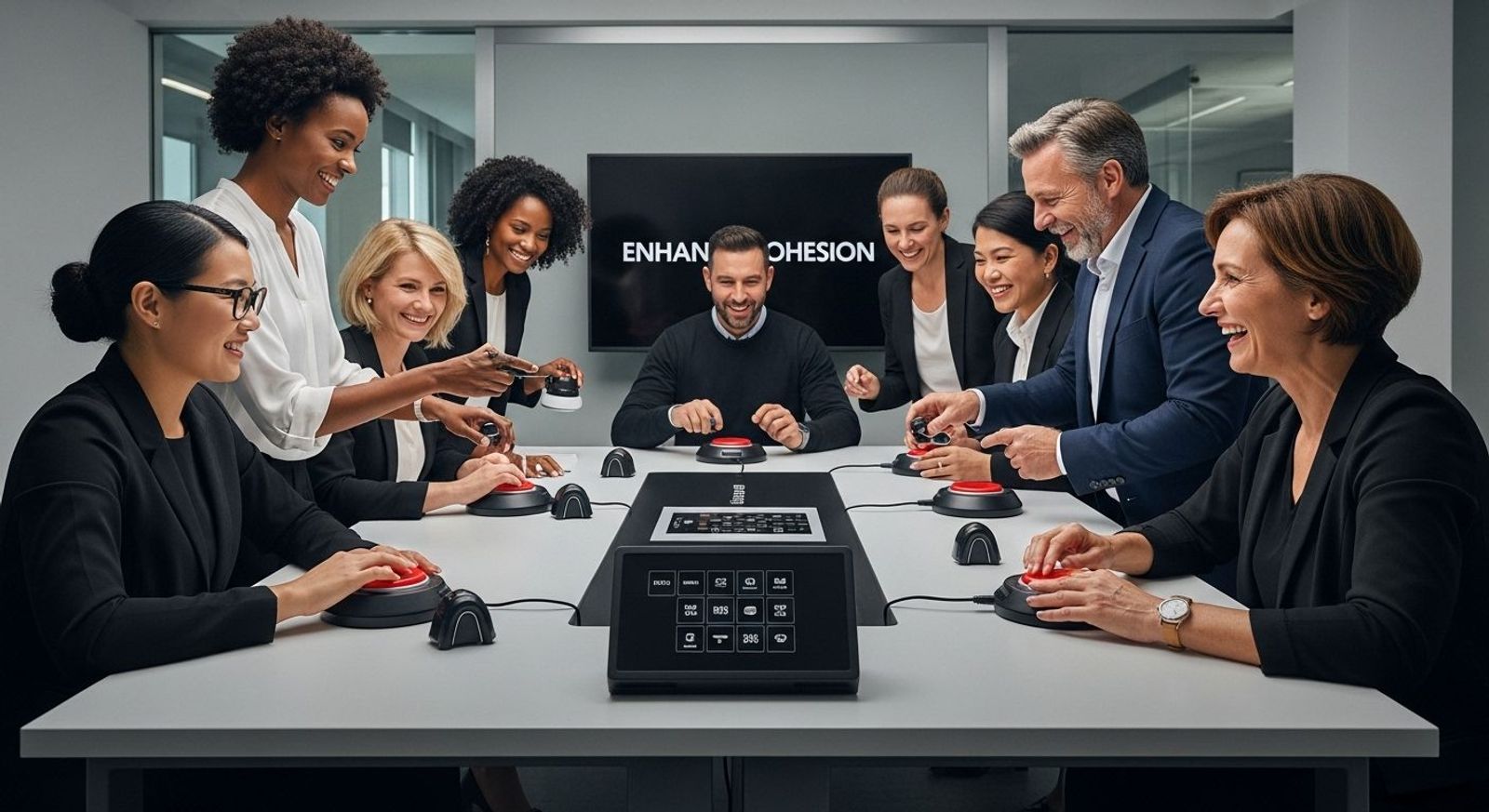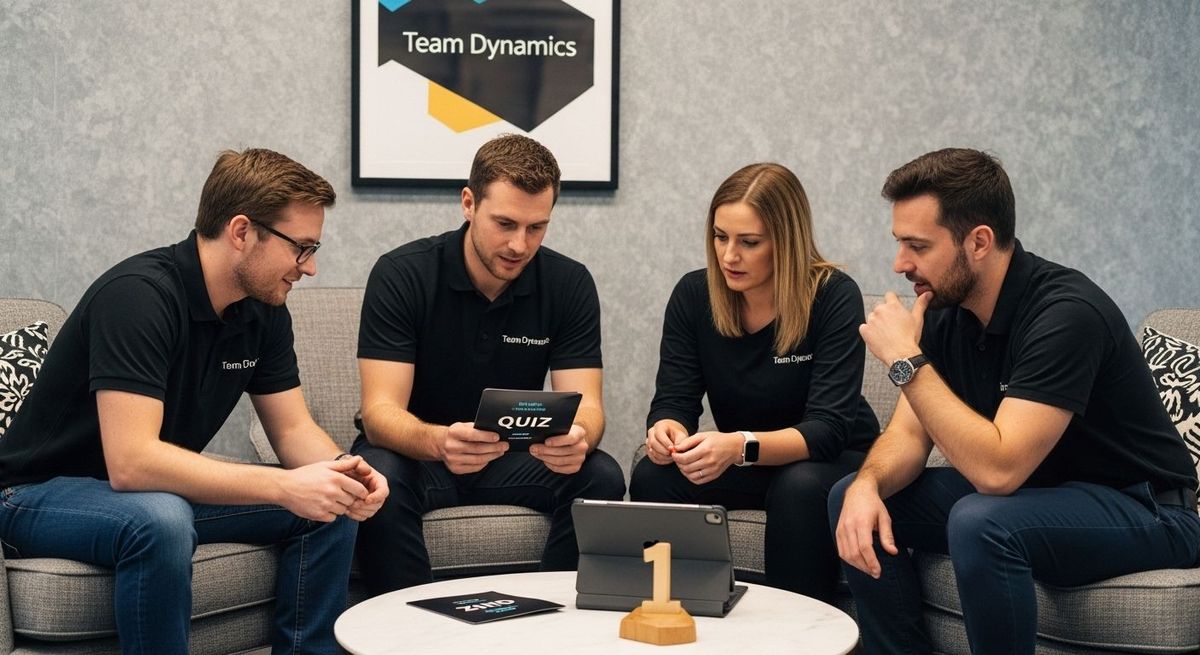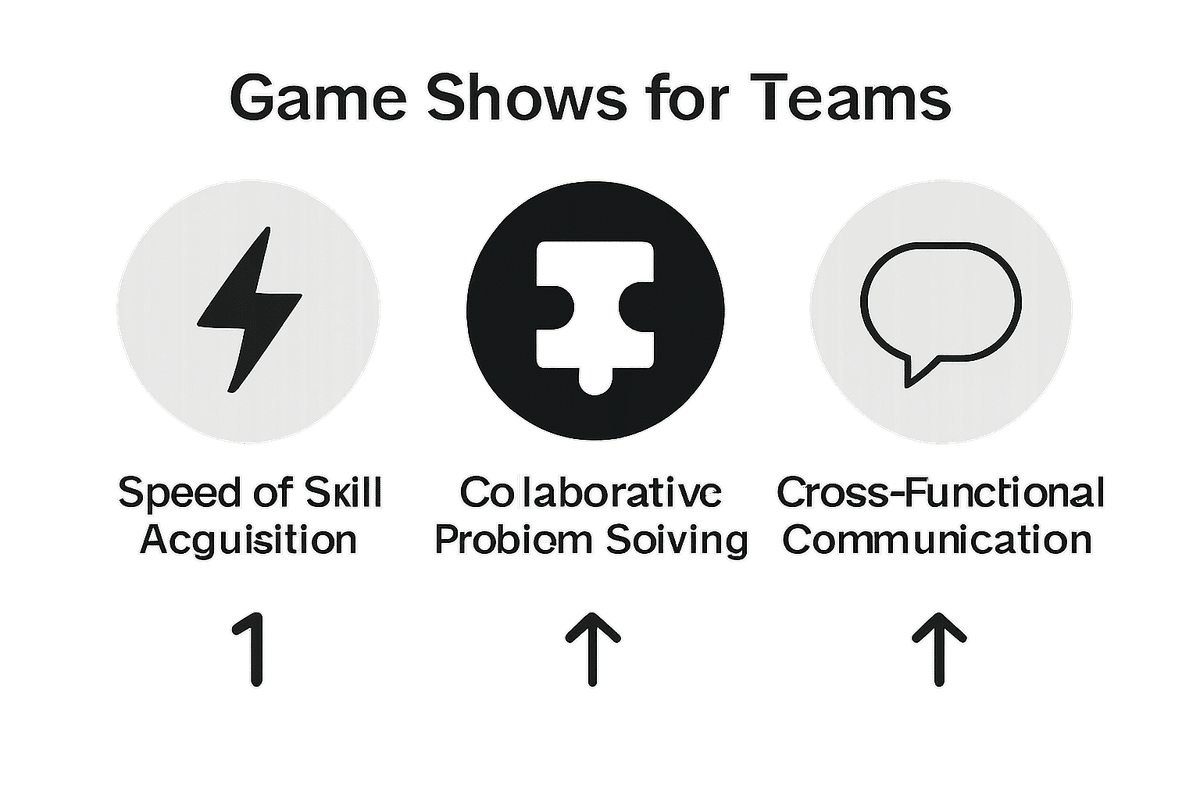Professional Bar Trivia SoftwareFor Venues & Events
- Players join via QR code — no app download
- 6 round types: Buzzer Race, Everyone Answers & more
- Rich media questions with images, video & audio
- Real-time scoring & leaderboards on the big screen
Understanding Why Game Shows for Teams Enhance Cohesion
September 29, 2025

Team training sessions often feel like a chore, yet organizations are always on the hunt for something that actually works. Here is something surprising. Teams using game show formats have reported up to 25 percent faster skill acquisition compared to traditional training methods. Forget stuffy workshops and endless slideshows. These interactive competitions do more than entertain. They spark true collaboration and communication in ways most workplaces never even attempt.
Table of Contents
- What Are Game Shows for Teams and Their Purpose?
- The Importance of Team Dynamics in the Workplace
- How Game Shows Foster Collaboration and Communication
- Key Concepts Behind Team-Building Game Shows
- Real-World Benefits of Using Game Shows for Teams
Quick Summary
| Takeaway | Explanation |
|---|---|
| Team game shows enhance learning | These interactive experiences promote engagement, making training more dynamic and memorable than traditional methods. |
| Boosts communication and collaboration | Game shows create safe scenarios for teams to practice effective communication and work together, essential for workplace success. |
| Enhances team dynamics and trust | By fostering positive interactions, game shows strengthen interpersonal relationships crucial for high-performing teams. |
| Facilitates skill development quickly | Structured challenges allow teams to acquire new skills faster while also enhancing problem-solving abilities. |
| Cultivates intrinsic motivation | The competitive and engaging format helps to boost intrinsic motivation, enhancing overall employee satisfaction and engagement. |
What Are Game Shows for Teams and Their Purpose?
Game shows for teams represent an innovative approach to organizational learning and team development that transforms traditional training methods into engaging, interactive experiences. These specialized formats blend entertainment with strategic skill-building, creating environments where professionals can learn, compete, and collaborate simultaneously.
The Core Concept of Team Game Shows
At their fundamental level, team game shows are structured competitive experiences designed to challenge groups through knowledge tests, problem-solving scenarios, and interactive challenges. Research from organizational psychology demonstrates that these formats leverage gamification principles to enhance intrinsic motivation and collective performance.
Team game shows typically include several key characteristics:
To clarify the essential elements that make team game shows effective for workplace development, the following table outlines their main characteristics and why each is important.
| Characteristic | Description |
|---|---|
| Competitive framework | Encourages healthy group interaction and shared goals |
| Clear rules and structured gameplay | Ensures fairness and sets expectations for participation |
| Immediate feedback mechanisms | Provides real-time input to guide improvement and boost motivation |
| Opportunities for skill demonstration | Lets team members showcase abilities in a supportive environment |
| Collaborative problem-solving requirements | Fosters teamwork and collective critical thinking in dynamic scenarios |
- Competitive framework that encourages group interaction
- Clear rules and structured gameplay
- Immediate feedback mechanisms
- Opportunities for skill demonstration
- Collaborative problem-solving requirements
Strategic Purposes of Team Game Shows
Beyond mere entertainment, team game shows serve multiple strategic organizational objectives. They are carefully designed tools for:
- Identifying team dynamics and communication patterns
- Encouraging cross-departmental collaboration
- Developing critical thinking and quick decision-making skills
- Breaking down hierarchical barriers within organizations
These experiences go beyond traditional training by creating memorable, emotionally engaging learning environments. Read more about interactive team engagement techniques that can transform workplace interactions and skill development.
By converting learning into a competitive yet supportive experience, team game shows provide a unique platform where professionals can grow, connect, and challenge themselves in ways traditional workshops cannot replicate.
The Importance of Team Dynamics in the Workplace
Team dynamics represent the complex psychological and interpersonal forces that shape how groups interact, communicate, and perform in professional environments. Understanding these intricate relationships is crucial for creating productive, innovative, and resilient workplace cultures.
Understanding Team Dynamics Fundamentally
At its core, team dynamics encompass the behavioral and psychological interactions that occur between team members during collaborative work. Research from the American Psychological Association reveals that these dynamics profoundly influence organizational performance, employee satisfaction, and overall workplace effectiveness.
The fundamental components of team dynamics include:
- Interpersonal communication patterns
- Trust and mutual respect
- Individual and collective emotional intelligence
- Conflict resolution mechanisms
- Shared goals and collaborative mindsets
Impact on Organizational Performance
Strong team dynamics directly correlate with enhanced organizational outcomes. Teams that demonstrate positive interpersonal interactions and effective communication strategies consistently outperform groups with poor relational frameworks.
These high-performing teams exhibit:
- Higher productivity levels
- More innovative problem solving
- Increased employee engagement
- Better adaptability to workplace challenges
Learn more about managing effective team dynamics to unlock your organization's full potential. By recognizing and nurturing positive team interactions, organizations can transform workplace environments from mere collections of individuals into powerful, synergistic units capable of exceptional performance.

How Game Shows Foster Collaboration and Communication
Game shows provide a unique and powerful platform for enhancing workplace communication and collaborative skills, transforming traditional interaction patterns into dynamic, engaging learning experiences. By creating structured yet entertaining environments, these interactive formats break down communication barriers and stimulate meaningful group interactions.
Psychological Mechanisms of Collaborative Learning
Research on collaborative learning techniques demonstrates that game show formats activate specific psychological mechanisms that promote team communication. These mechanisms work by creating low-pressure scenarios where participants can practice critical interpersonal skills without traditional workplace constraints.
Key psychological triggers in game show environments include:
- Shared goal orientation
- Controlled competitive environments
- Immediate performance feedback
- Reduced hierarchical barriers
- Playful learning contexts
Communication Skill Enhancement Strategies
Game shows strategically design challenges that compel teams to communicate effectively, requiring participants to:
- Actively listen to teammates
- Articulate complex ideas succinctly
- Negotiate and compromise
- Provide constructive feedback
- Synthesize diverse perspectives
Explore more about communication team building activities that can revolutionize workplace interactions. By gamifying communication practice, organizations create safe, enjoyable spaces where professionals can develop crucial interpersonal skills while feeling genuinely engaged and motivated.
Key Concepts Behind Team-Building Game Shows
Team-building game shows represent a sophisticated approach to organizational learning that integrates psychological principles, interactive design, and strategic skill development. These innovative experiences are grounded in complex theoretical frameworks that transform traditional training methodologies into engaging, purposeful interactions.
Theoretical Foundations of Gamified Learning
Research on social interdependence theory reveals that team game shows leverage intrinsic psychological mechanisms to promote collective achievement and mutual accountability. These experiences are carefully constructed to create environments where individual success becomes interconnected with group performance.
Critical theoretical underpinnings include:
- Social learning theory
- Intrinsic motivation principles
- Experiential learning frameworks
- Group dynamics research
- Cognitive interdependence models
Strategic Design Elements
Effective team-building game shows incorporate multiple strategic design elements that facilitate meaningful learning and interaction. These elements are meticulously crafted to ensure participants remain engaged while developing essential professional skills.
Key design principles encompass:
- Structured yet flexible challenge formats
- Clear performance metrics
- Balanced competitive and collaborative components
- Immediate feedback mechanisms
- Psychological safety environments
Explore innovative team building techniques that can transform workplace interactions. By understanding these nuanced conceptual frameworks, organizations can create powerful learning experiences that transcend traditional training approaches and genuinely enhance team capabilities.
Real-World Benefits of Using Game Shows for Teams
Team game shows represent more than entertainment strategies they are sophisticated tools for organizational development that deliver tangible, measurable benefits across multiple professional domains. These interactive experiences transform workplace learning from passive absorption to active, engaging participation.
Performance and Productivity Enhancement
Research on team-based learning interventions demonstrates that game show formats can significantly improve collective problem-solving capabilities and organizational performance. By creating structured yet dynamic learning environments, these experiences unlock potential that traditional training methods often fail to activate.

Key performance benefits include:
- Accelerated skill acquisition
- Enhanced collaborative problem solving
- Increased team adaptability
- Improved cross-functional communication
- Reduced training time and costs
Psychological and Motivational Outcomes
Beyond measurable performance metrics, team game shows generate profound psychological impacts that reshape workplace interactions. These experiences cultivate intrinsic motivation, build psychological safety, and create positive emotional connections among team members.
Psychological advantages encompass:
This table summarizes the emotional and psychological impacts that team game shows deliver, helping clarify how these benefits contribute to stronger teams.
| Psychological Benefit | How It Supports Teams |
|---|---|
| Reduced workplace stress | Creates fun, low-pressure environments that relieve everyday tension |
| Increased team trust | Fosters open communication and honest collaboration |
| Higher employee engagement | Promotes active participation and emotional investment |
| Improved emotional intelligence | Enhances understanding and management of team emotions |
| Enhanced interpersonal understanding | Builds deeper awareness of team members' strengths and perspectives |
- Reduced workplace stress
- Increased team trust
- Higher employee engagement
- Improved emotional intelligence
- Enhanced interpersonal understanding
Discover more team building strategies that can transform workplace dynamics. By integrating game show methodologies, organizations can create powerful learning experiences that simultaneously develop skills, boost morale, and foster a culture of continuous collaborative growth.
Transform Team Cohesion Into Real Results with Quizado
Is your organization ready to bridge the gap between theory and practice when it comes to team unity? Throughout this article, you've learned how game shows for teams activate collective motivation and strengthen emotional bonds, helping teams communicate better and solve problems together. Yet, many managers find it difficult to implement these positive dynamics consistently in real workplace scenarios. If you want to boost trust, build authentic connections, and make collaboration second nature, dedicated tools make all the difference. To explore how emotional factors play a role in effective teamwork, visit our emotions category.

Bring the insights from this article to life by creating your own interactive, customizable game show experience. Quizado provides a platform designed to turn theoretical benefits into everyday reality, letting your team build skills and cohesion with engaging, personalized quizzes that can be played online or in person. Ready to experience truly unified teamwork? Start building team trust and engagement with Quizado right now.
Frequently Asked Questions
What are game shows for teams?
Game shows for teams are structured competitive experiences designed to enhance team dynamics, communication, and collaboration through engaging challenges that promote skill development and collective problem-solving.
How do team game shows improve team cohesion?
Team game shows improve cohesion by creating an interactive environment where team members collaborate, communicate, and motivate each other, fostering trust and a sense of belonging within the group.
What skills can teams develop through game shows?
Teams can develop critical skills such as effective communication, teamwork, quick decision-making, problem-solving, and emotional intelligence through the competitive and supportive atmosphere of game shows.
Are there measurable benefits of using game shows for team building?
Yes, research indicates that team game shows can enhance performance, increase productivity, improve cross-functional communication, and foster intrinsic motivation among team members.
Recommended
- Understanding Building Team Cohesion Explained - Blog
- Understanding Why Use Game Shows for Engagement and Learning - Blog
- Understanding Effective Ways to Promote Teamwork - Blog
- How to Customize Team Games for Enhanced Collaboration - Blog
- How to Play Classroom Virtual Game Shows - Academic Entertainment
- Designing Spaces for Teamwork: Boost Collaboration in 2025 - Office Furniture Dubai | Buy Modern Office Furniture Dubai - SAGTCO
Start Hosting Bar Trivia Tonight
Try Quizado free — no download needed. Host your first trivia night tonight!

